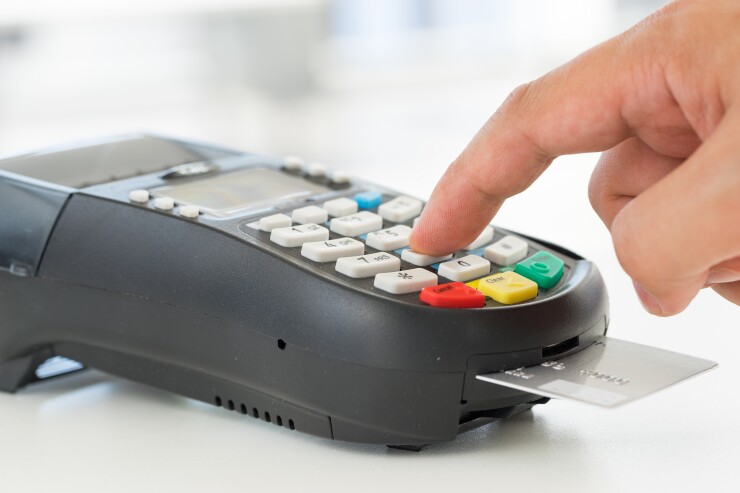Want unlimited access to top ideas and insights?
Responding to a Federal Trade Commission inquiry, Visa Inc. has clarified its position on EMV debit card routing to address growing concern among merchants that the card brand's rules were forcing those transactions onto the Visa network rather than allowing merchants to choose among less expensive options.
In a
Last week, a
Merchants were upset both by the fact that consumers were being prompted to make this choice for them and by the way the choice was presented; the average consumer would likely avoid choosing "U.S. Common" or "U.S. Debit" without any type of explanation of what it meant.

Visa had said it was not forcing its merchants to route on the Visa network, but merchants insisted that the wording in some merchant contracts stipulated consumer choice was a top priority for the card brand. Visa had stated its position in a June post on its website regarding merchant and acquirer flexibility in designing the consumer-facing prompts at the point of sale.
The Nov. 22 post more fully addresses the issue, stating: "For U.S. EMV enabled debit cards, merchants have the flexibility to use either the U.S. Common Debit AID or the Visa AID. Merchants are never required to ask cardholders to choose the AID for processing debit transactions. Merchants can exclusively route U.S. debit transactions using the Common AID, if they choose. Merchants are never required to use the Visa AID to process U.S. debit transactions."
Liz Garner, vice president of the Merchant Advisory Group, said the work of the FTC and other market participants shows that "Visa got caught doing something that was against the Reg II (Durbin routing) law, so this is really a good thing in showing the diligence to approach this issue."
In addition to the above statement, Visa reiterated that merchants can promote their preferred verification method, including by discouraging the use of signature. Since the introduction of an EMV chip card timeline in the U.S. more than three years ago, Visa has been more supportive of chip-and-signature than chip-and-PIN, saying it was a less expensive and faster process for merchants to convert.
"Visa has really clarified that merchants can promote their preferred method," Garner said. "That includes just prompting for PIN, and that's a more secure transaction and is good for consumers overall."
Even better, Garner said, is that Visa is supporting the right to route to all networks regardless of verification method. "This is a big deal because it could go even further to include biometrics and emerging technology, and this has been a real issue in terms of the EMVCo brands licensing those methods to the common AID."
If new verification methods are not applied to the common AID, the brands would find themselves again in violation of Reg II, Garner added.
However, some merchants insisted that the financial commitment to EMV should be backed by the stronger security that PIN adds against lost or stolen card fraud at the point of sale.
Visa did note that in instances in which the merchant automatically prompts for PIN on card-present transactions, "they must minimally ensure that a cardholder presenting a Visa debit card for payment can originate a transaction using a signature, or no CVM, even if the cardholder is prompted or steered to enter a PIN."
That stipulation relates to
Walmart filed a lawsuit against Visa in May regarding debit routing, but Visa turned around a month later and filed a
The independent debit networks that have been part of the Common AID debate for the past four years include NYCE, Pulse, Jeanie, Star, Shazam, CO-OP Financial, Presto, AFFN, NETS and ATH.
The number of independent debit networks in the U.S. created complexity in the Durbin routing mandate because other EMV global markets generally dealt with only one or two independent networks. It led to a years-long debate on how common AID technology would be developed and governed once the EMV liability shift took hold in October 2015.





